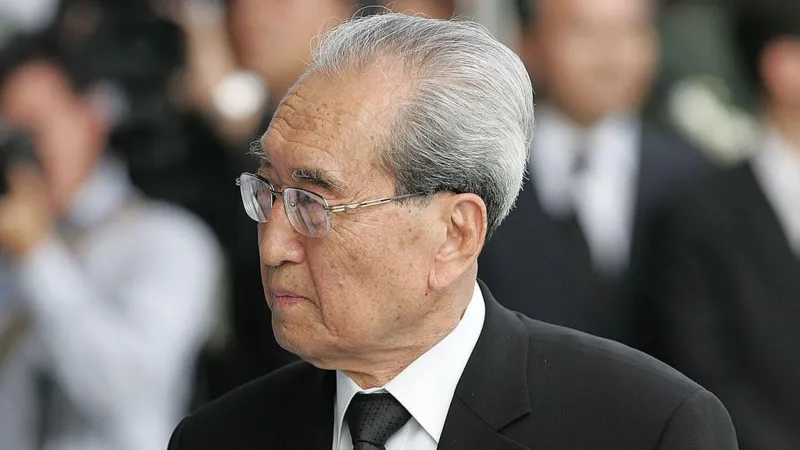Kim family's master propagandist dies at 94
North Korea's former propaganda master Kim Ki Nam has died at the age of 94, said state media.

He died due to old age and "multiple organ dysfunction" for which he had been receiving treatment since 2022, said KCNA.
He had spent decades leading propaganda efforts in the totalitarian state, including building a personality cult around the ruling Kim dynasty.
North Korean leader Kim Jong Un attended his funeral early on Wednesday and paid tribute to the "veteran revolutionary who had remained boundlessly loyal" to the regime, the report added.
South Korea's Yonhap news agency likened him to Nazi Germany's propaganda boss Joseph Goebbels, widely known for his mantra "repeat a lie often enough and it becomes the truth".
Kim Ki Nam had no blood relations with the ruling patriarchy despite sharing the family name that is among the most common in North and South Korea.
He was appointed deputy director of Pyongyang's Propaganda and Agitation Department in 1966, where he worked closely with Kim Jong Il, the predecessor and father of current leader Kim Jong Un.
Kim Ki Nam later rose to lead the department, playing a crucial role in shaping the country's messaging, as he served what has now become the world’s longest-running family dynasty.
He reportedly had a close relationship with Kim Jong Il, with several media reports describing them as "drinking buddies".
In the 1970s, he was put in charge of the state mouthpiece, Rodong Sinmun newspaper.
He later led initiatives to establish the role of Kim Il Sung - widely seen as North Korea's founding father - in the country's history, and to support Kim Jong Il's succession of the leadership, according to North Korea Leadership Watch, a site on Pyongyang's political culture.
The propaganda department Kim Ki Nam oversaw maintained a stranglehold over communication and information flows in an out of the state.
South Korean and Western entertainment, including music and movies, are banned.
Rare footage obtained by BBC Korean early this year showed the public sentencing of two teenage boys to 12 years of hard labour for watching K-dramas.
State television had also blurred the trousers of British presenter Alan Titchmarsh in a BBC gardening programme because jeans are seen as a symbol of Western - and specifically American - imperialism in the country.
Kim Ki Nam is one of few North Korean officials to have visited the South, leading a delegation to attend the funeral of former South Korean president Kim Dae-jung in 2009.
One example of how the propaganda machine kicked into action was after the sudden death of Kim Jong Il in 2011. This hastened the ascent of his son, Kim Jong Un, as the country's leader. The young Kim was believed to be just in his 20s at that time.
"No force on earth can check the revolutionary advance of our party, army and people under the wise leadership of Kim Jong Un," read one of the first KCNA reports after Kim Jong Il's death.
"Under the leadership of Kim Jong Un we should turn our sorrow into strength and courage and overcome the present difficulties," the report said.
In 2015, images on state media showed the tall, bespectacled Kim Ki Nam - in his 80s at that time - standing among a group of military officials and taking notes while Kim Jong Un spoke.
He had retired in the late 2010s, passing on his role to Kim Jong Un's sister Kim Yo Jong, but continued to appear at public events - a sign that he remained on good terms with the regime.
"Kim Jong Un kept Kim Ki Nam in key propaganda positions for years, indicating that he, like his father, trusted and relied on him," said Rachel Lee, a Senior Fellow at the US-based think tank 38 North Program.
Ms Lee added that the Rodong Sinmun dedicated its entire frontpage on Wednesday to Kim Ki Nam's death and details of his funeral and this "speaks to the respect accorded to him".
Leif-Eric Easley, a professor at Ewha University in Seoul, said Kim Ki Nam's death marks "the end of an era" for North Korean propaganda.
"This is someone who sought to glorify the Pyongyang regime in a way to appeal across and beyond the Korean Peninsula," he said.
The state's propaganda machine has since departed from the previous generation’s spin on pan-Korean nationalism, Prof Easley said.
"Now, Kim Jong Un demonises South Koreans and heavily relies on nuclear weapons for political legitimacy," he said.
-bbc







